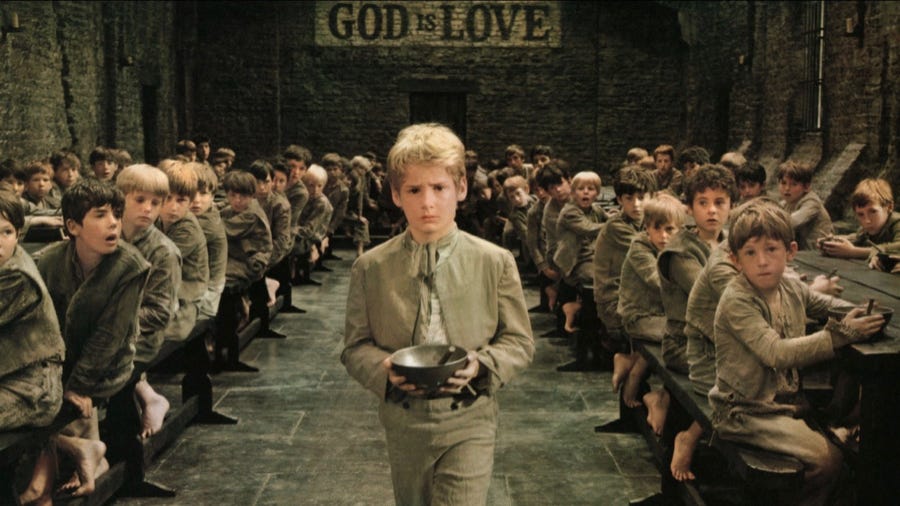Is it worth the waiting for?
If we live till eighty four
All we ever get is gruel!
Every day we say our prayer
Will they change the bill of fare?
Still we get the same old gruel!
Gru-el. Sounds dreadful, doesn’t it? Have you ever had it? Do you know what it’s made from? I have to admit to a ‘no’ on both counts. And that’s despite several long and hard years at Dotheboy’s Hall, which included stainless steel spoonfuls of frog-spawn pudding, stale spotted dick and freeze-dried mashed potato: force-fed by Irish hags in stained nylon housecoats. Stop any reasonable person in the street and ask them the same question, and I bet you’ll get a blank look and a vague answer: “A watery soup?”... “A porridge made from floor sweepings, perhaps?”… “Something to do with Dickens?”
Now our old friend, Wikipedia, rather sniffily describes it thus: ‘From a literary... or bourgeois point of view... (gruel) has often been associated with poverty... Gruel was on the Third Class menu of The Titanic on the eve of her sinking.’ And so it was, and so it has. Essentially, gruel is a generic term for a cereal: oat, wheat, rye flour or rice boiled in water and milk to create a thin porridge or soup; it was the staple diet of the Ancient Greeks. It can also be made from acorns. The photograph on Wikipedia looks appalling. However, according to Stefan Gates’s brilliantly subversive Gastronaut (BBC, 2005), a book, incidentally, which includes detailed instructions on how to catch, cook and eat the kiddywinks’ guinea-pigs, ‘it’s actually quite pleasant…’, especially with ‘a splash of brandy… and a piece of orange peel.’
I mention all this only in passing, as to play the Sigmund Freud word game (guttural Austrian accent and sofa required), the word gruel will forever be associated with Dickens and Oliver Twist, and in more recent times, Oliver! — Sir Carol Reed’s film of 1968, with a screenplay by Vernon Harris, based on the Lionel Bart musical. The mid-to-late Sixties was a good time for musicals, which is curious, as with everything else going on — drugs, social revolution, the counter-culture, psychedelia, the Summer of Love — one might have thought the good-old-fashioned musical (film) a thing of the past; except that it wasn’t: and so we have (from the top of my head): The Sound of Music (1965), Mary Poppins (1964), My Fair Lady (1964), Camelot (1967), Funny Girl (1968), Oliver! (1968), Chitty Chitty Bang Bang (1968), Hello Dolly! (1969) and Sweet Charity (1969). And do you know what? Oliver! (1968) is one of the very best. It’s a cracking film which won no less than six Academy Awards. A Christmas favourite. And, incidentally, a British film too. No Hollywood for this one, apart from the distribution courtesy of Columbia.
Lionel Bart was, of course, brilliant. He was born in 1930 to a poor Jewish background in Stepney. His father, a tailor, apparently worked from a garden shed. Described by Andrew Lloyd-Webber as 'the father of the British musical’, in 1963, Bart won a Tony Award for the score of Oliver! , and in the same year, wrote the theme song for From Russia with Love (1963) — I had forgotten that — performed beautifully by the singing 'bus driver, Matt Monroe (Britain's answer to Nat King Cole, a voice like treacle) and, previously, Cliff's Living Doll in 1959. Lionel was very much part of the Swinging London scene, too, which gives me an excuse for an amusing tale. A true story. In Nineteen-Sixty-Something, my grandparents bought Lionel Bart's drophead Mercedes Coupé. I'm not sure if they bought the car directly from him or via somebody else in a newspaper ad. (for Mr. Bart was a considerable petrolhead) — but the problem was that when they drove it around London, the car attracted consistent, considerable, undesirable and unwanted attention. Driving down The King's Road, pretty girls (and, no doubt, pretty boys too) would shout out "Lionel! Daaarling!" as my grandmother sped past, which didn't go down at all well — and so, alas, the car had to go. It lasted a month.
Cinema (and especially television) likes a spot of Dickens. There is, of course, A Christmas Carol, in numerous adaptations; David Lean's Great Expectations (1946) and Oliver Twist (1948) (both terrific), the Hugh Whitemore tea-time television adaptation of David Copperfield (1974), Andrew Davis' adaptation of Bleak House (2005), similar, and Christine Edzard's Little Dorrit (1987) — a superb five-and-three-quarter hour Dickensian marathon, spread over two parts: up there in my all-time favourite film list, and a film(s) we will be returning to in the New Year.
Keep reading with a 7-day free trial
Subscribe to Luke Honey's WEEKEND FLICKS. to keep reading this post and get 7 days of free access to the full post archives.







